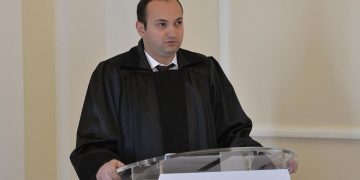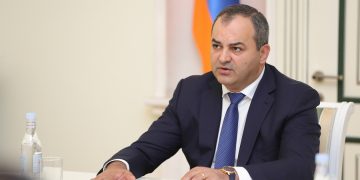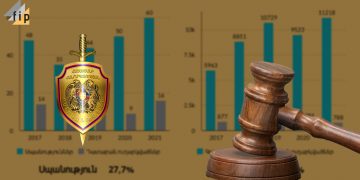The Prosecutor General’s Office announced on June 4 that the Prosecutor General has appealed to the government regarding the legal regulation and control of information security on online platforms.
“In recent years, in the conditions of the wide spread of the Internet, national, religious, sexual or other discrimination, circulation of materials prohibited in the Republic of Armenia, including drug advertisements, or information containing an open invitation to sale or other criminal manifestations, have become widespread through Internet websites and social networks,” the prosecutor’s office’s statement reads.
The Prosecutor’s Office notes that the study of domestic legislation revealed that the security of information disseminated through widely visible Internet resources is not legally ensured in RA, there are no legal regulations, and no body is empowered to exercise control over information security and take measures arising from it.
“In the absence of such control, information resources continue to spread such content unhindered distorting and abusing the democratic principle of freedom of speech,” the statement reads.
Based on the above, RA General Prosecutor Artur Davtyan addressed a letter to the RA government offering to discuss the issue of subjecting the security of information disseminated through Internet resources to legal regulation, and implementing state control in the field based on it, with the guarantee of the constitutional right to freely express the opinion.
The Prosecutor’s Office cites the example of Russia, Germany and Georgia as justification, but refers in more detail to Russia and Germany, to the legislative regulations implemented by those countries in that sphere.
Media expert Samvel Maritirosyan addressed the topic in an article the other day.
“Prosecutor’s office presents Roskomnadzor as the best international practice, whose glorious example it suggests to follow. […] If we take the Russian path, from the beginning a fight will be declared against drugs and suicide calls on the Internet. And then one fine day we will discover that the state is engaged in blocking. Moreover, mainly of a political nature,” Martirosyan writes in his Media.am column.
Fact Investigation Platform decided to find out what kind of reactions the examples given by the General Prosecutor’s Office and their application received in those countries or by international organizations.
Russia
The Prosecutor’s Office cites the RF Law on Information, Information Technologies and Information Protection” and the federal body of executive power (Roskomnadzor) as justification.
However, both the said law and Roskomnadzor have been repeatedly criticized by international organizations for restricting and censoring freedom of speech and expression.
The Russian law on Information, Information Technologies and Information Protection was criticized not only by international human rights organizations, but also by the UN special rapporteur on the promotion and protection of the right to freedom of opinion and expression. In his report, he addressed in detail the gaps in the law and the inadmissible provisions from the point of view of freedom of speech, urging the Russian government to review the law and withdraw the provisions restricting freedom of speech.
As far as Roskomnadzor is concerned, there is some information in the Armenian press about its activities restricting the spread of media. For example, several years ago, Media.am wrote that at the demand of Roskomnadzor, Armenian websites are blocked one by one in the territory of the Russian Federation. “For several weeks, it has not been possible to open the Russian page of Aravot.am in the territory of Russia. Hetq.am, Regnum, ArmeniaSputnik, ArmRus.info, etc. received warnings or were temporarily blocked.”
The international human rights organization Human Rights Watch has repeatedly addressed the activity of Roskomnadzor in its reports noting that Russia regularly increases the legal base regulating its media field with the aim of increasing the scale of censorship and making the media field more controllable. And Roskomnadzor, as a federal body for controlling information technology and mass communication, actually targets and pursues media, creates special blacklists of media outlets and in the end either blocks them or establishes total control over them.
Germany
The General Prosecutor’s Office of Armenia also cites the law on Improving the State of Law Enforcement in Social Networks in force in Germany as a justification for its initiative.
However, this law also is not received unambiguously. It has been severely criticized by a number of European and international human rights organizations and journalistic organizations.
According to Wenzel Michalski, Germany director of Human Rights Watch, the law is completely flawed. “The law can lead to unaccountable and widespread censorship, and it urgently needs to be revised. The law sets a dangerous precedent for other governments seeking to restrict online speech by forcing companies to conduct censorship on behalf of the government.”
The UN Human Rights Committee also expressed its concerns about the uncertainties in the law and the threats to freedom of expression in its report on Germany. “The Committee is concerned about the broad powers that the law provides to remove content that appears to be illegal or offensive. The Committee also notes with concern that the responsibility for removing such content rests with the companies that manage social networks and is not subject to judicial review, which limits the possibility of compensation for damages in cases where the nature of the content is contested. The Committee is concerned that these provisions and their application may have a restrictive effect on freedom of expression on the Internet.”
Interesting developments regarding this law took place in Germany at the beginning of this year as well. 4 media giants: Google, Facebook (Meta), Twitter and TikTok refused to comply with the law and filed a lawsuit at the Cologne Administrative Court to challenge the law.
Thus, the examples cited by the General Prosecutor’s Office of Armenia as justification contain many shortcomings and challenges from the point of view of the right to freedom of speech and expression. They have been criticized by international authoritative organizations and are far from being exemplary.
Mher Taroyan

 FACTOMETER
FACTOMETER










